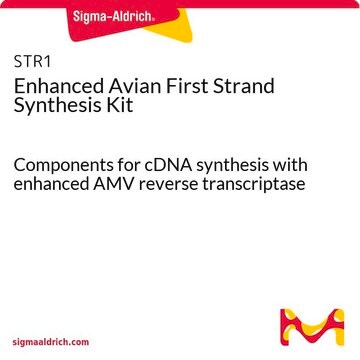03353621001
Roche
5′/3′ RACE Kit, 2nd Generation
sufficient for 10 reactions
Seleccione un Tamaño
US$ 778,00
Seleccione un Tamaño
About This Item
US$ 778,00
Productos recomendados
uso
sufficient for 10 reactions
Nivel de calidad
fabricante / nombre comercial
Roche
Condiciones de envío
dry ice
temp. de almacenamiento
−20°C (−15°C to −25°C)
Categorías relacionadas
Descripción general
Especificidad
Transcriptor Reverse Transcriptase: 85 °C for 5 minutes
Aplicación
- Structural and expression studies of RNA molecules[3]
- Generating full-length cDNAs[4][5]
- Isolation and characterization of 5′ or 3′ ends from low-copy RNA messages[6]
- first strand cDNA synthesis[6]
- Amplification and further cloning of rare mRNAs[6]
- Use in conjunction with exon-trapping methods
- Products of the RACE reaction can be directly sequenced without cloning
Características y beneficios
- Robust performance: Recombinant Transcriptor Reverse Transcriptase allows procession through regions of difficult secondary RNA structure.
- Convenient: Function and expression studies of either 5′ or 3′ end of the RNA can be performed with the same kit.
- Reliable: dA tailing of cDNA with Recombinant Terminal Transferase decreases the likelihood of inappropriate truncation.
- Reproducible: Oligo dT-anchor primer with non 3′dT ensures correct binding to the inner end of the poly (A) tail.
- Produce long fragments: Generate cDNA up to 14kb in length with Transcriptor Reverse Transcriptase.
Envase
Otras notas
Solo componentes del kit
- cDNA Synthesis Buffer 5x concentrated
- Transcriptor Reverse Transcriptase 20 U/μl
- Deoxynucleotide Mix
- dATP, pH 7.5 (20 °C)
- Reaction Buffer 10x concentrated
- Terminal Transferase, recombinant
- Control neo-RNA 1 ng/μl
- Oligo dT-Anchor Primer
- PCR Anchor Primer
- Control Primer neo1/rev primer 12.5 μM
- Control Primer neo2/rev primer 12.5 μM
- Control Primer neo3/for primer 12.5 μM
Código de clase de almacenamiento
12 - Non Combustible Liquids
Clase de riesgo para el agua (WGK)
WGK 1
Punto de inflamabilidad (°F)
does not flash
Punto de inflamabilidad (°C)
does not flash
Elija entre una de las versiones más recientes:
¿Ya tiene este producto?
Encuentre la documentación para los productos que ha comprado recientemente en la Biblioteca de documentos.
Los clientes también vieron
Artículos
In addition to the troubleshooting provided in the product manual, most probably the efficiency of the tailing reaction performed by Terminal Transferase could be impaired. This could occur due to several reasons (which will not only affect the control reaction, but 5′ RACE in general):
Nuestro equipo de científicos tiene experiencia en todas las áreas de investigación: Ciencias de la vida, Ciencia de los materiales, Síntesis química, Cromatografía, Analítica y muchas otras.
Póngase en contacto con el Servicio técnico










